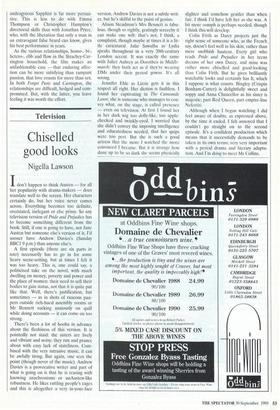Television
Chiselled good looks
Nigella Lawson
Idon't happen to think Austen — for all her popularity with drama-makers — does translate well to the screen. Her characters certainly do, but her voice never comes across. Everything becomes too definite, overstated, inelegant or else prissy. So any television version of Pride and Prejudice has to become something different from the book. Still, if one is going to have, not Jane Austen but someone else's version of it, I'd sooner have Andrew Davies's (Sunday BBC1 9 p.m.) than anyone else's.
A first episode (there are six parts in tow) necessarily has to go in for some heavy scene-setting, but at times I felt it was too heavy. This is, one could say, a politicised take on the novel, with much dwelling on money, poverty and power and the place of women: their need to sell their bodies to gain status, not that it is quite put like that. Well, there's justification, but sometimes — as in shots of raucous pau- pers outside rich-hued assembly rooms or Mr Bennett sucking anxiously on quill while doing accounts — it can come on too strong.
There's been a lot of hooha in advance about the fleshiness of this version. It is pointedly not staid: the sisters are lively and vibrant and noisy; they run and prance about with easy lack of stateliness. Com- bined with the very intrusive music, it can be awfully tiring. But again, one sees the point (though never of the music). Andrew Davies is a provocative writer and part of what is going on is that he is teasing with knowing anachronisms or unAusten-like robustness. He likes rattling people's cages and this is altogether a very in-your-face version. Andrew Davies is not a subtle writ- er, but he's skilful to the point of genius.
Alison Steadman's Mrs Bennett is fabu- lous, though so rightly, gratingly screechy it can make one wilt: that's not, I think, a complaint, though maybe at times it is a lit- tle caricatural. Julie Sawalha as Lydia speaks throughout in a very 20th-century London accent. It was exactly the same with Juliet Aubrey as Dorothea in Middle- march: they both act as if they're wearing DMs under their period gowns. It's all wrong.
Jennifer Ehle as Lizzie gets it in this respect all right. Her diction is faultless. I found her captivating in The Camomile Lawn; she is someone who manages to con- vey what, on the stage, is called presence — even on television. At first I found her in her dark wig too dolly-like, too apple- cheeked and twinkly-eyed. I worried that she didn't convey the imposing intelligence and educatedness needed, that her quips were too pert. But she is such a good actress that the more 1 watched the more convinced I became. But it is strange how done up to be so dark she seems physically
slighter and somehow gentler than when fair. I think I'd have left her as she was. A bit more oomph is perhaps needed, though I think this will develop.
Colin Firth as Darcy projects just the right sense of someone who, as the French, say, doesn't feel well in his skin, rather than mere snobbish hauteur. Every girl who reads Pride and Prejudice in her teens dreams of her own Darcy, and mine was rather more chiselled and good-looking than Colin Firth. But he gives brilliantly watchable looks and certainly has It, which I suppose is what counts. Bingley (Crispin Bonham-Carter) is delightfully sweet and soppy and Anna Chancellor as his sister is majestic; part Red Queen, part empire-line Nefertiti.
Although when I began watching I did feel aware of doubts, as expressed above, by the time it ended, I felt annoyed that I couldn't go straight on to the second episode. It's a confident production which means that it successfully demands to be taken in its own terms; very very important with a period drama and literary adapta- tion.. And I'm dying to meet Mr Collins.


































































 Previous page
Previous page